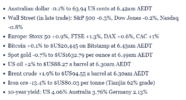bigdog
Retired many years ago
- Joined
- 19 July 2006
- Posts
- 8,215
- Reactions
- 5,655

Stocks fall broadly on Wall Street as inflation worries grow
Stocks ended broadly lower on Wall Street, leaving most major indexes in the red for the week, as more concerns emerged about inflation.
Stocks fall broadly on Wall Street as inflation worries grow
By DAMIAN J. TROISE and ALEX VEIGAMore worries about inflation helped spur a broad slide for stocks Friday that left most of the major indexes on Wall Street in the red for the week and wiped out much of the market’s gains from a strong rally a day earlier.
A report showing U.S. consumers raised their expectations for future inflation hurt markets worldwide, offering another signal the Federal Reserve may have to continue aggressively hiking interest rates to temper stubbornly hot inflation. The strategy raises the risk of a recession.
The S&P 500 fell 2.4% after having been up as much as 1.2% in the early going. The Dow Jones Industrial Average fell 1.3% and the Nasdaq composite ended 3.1% lower. Both indexes also turned lower after marching higher in early trading.
Trading has been unsettled all week and was especially volatile on Thursday after a government report showed that inflation remains very hot. Major U.S. indexes staged their biggest comeback in years on Thursday in a reversal from steep morning losses
“I don’t think that (the rally) technically or fundamentally means anything because a whole lot hasn’t changed,” said Sylvia Jablonski, chief investment officer at Defiance ETFs. “I don’t think we’re likely to see any sense of direction or stability in the near term.”
Investors have been looking for any sign that could allow the Fed to eventually ease up on its interest rate increases. Fed Chair Jerome Powell has said Americans’ expectations for future inflation plays a big role in setting interest rates, because a runaway there could create a much more dangerous, self-fulfilling spiral.
The central bank has already raised its benchmark interest rate five times this year, with the last three increases by three-quarters of a percentage point. Wall Street expects another raise of three-quarters of a percentage point at its next meeting in November.
Inflation, though cooling in some areas of the economy, remains stubbornly hot overall. A survey from the University of Michigan on Friday showed that consumers raised their expectations for future inflation. It also showed that overall consumer confidence remains surprisingly strong despite high prices on a wide range of goods.
“Core inflation is running at levels that are too high, and the University of Michigan’s numbers today show that it is starting to feed into consumers’ expectations, and that’s almost exactly to a ‘T’ what the Fed would like to avoid,” said Sameer Samana, senior global market strategist at Wells Fargo Investment Institute.
The S&P 500 fell 86.84 points to 3,583.07. The Dow dropped 403.89 points to 29,634.83. The Nasdaq slid 327.76 points to close at 10,321.39.
Small company stocks also fell sharply. The Russell 2000 gave up 46.01 points, or 2.7%, to close at 1,682.40.
Bond yields rose after the Michigan report. The yield on the 10-year Treasury, which influences mortgage rates, rose to 4.02% from 3.86% shortly before the report came out. It’s trading near its highest level since 2008.
The yield on the 2-year Treasury, which tends to track expectations for future Fed action, rose to 4.51% from 4.40% just before the report came out
Investors also focused on the latest earnings reports for more clues about how companies are dealing with inflation.
Several big banks were bright spots in the market. JPMorgan Chase rose 1.7% after reporting earnings and revenue that topped Wall Street forecasts. Wells Fargo rose 1.9% after it reported strong revenue.
UnitedHealth Group rose 0.6% after raising its profit forecast for the year.
More than 90% of the stocks in the S&P 500 closed in the red. Technology stocks were biggest weights on the index. Chipmaker Nvidia fell 6.1%.
U.S. crude oil prices fell 3.9% and weighed down energy stocks. Chevron fell 3.1%.
Markets in Europe closed higher after British Prime Minister Liz Truss has abandoned a planned cut to corporation taxes, scrapping a key part of an economic plan that set off weeks of market and political turmoil.
A government report showed that the pace of sales at U.S. retailers was unchanged in September from August as rising prices for rent and food chipped away at money available for other things. The report was worse than economists anticipated
















